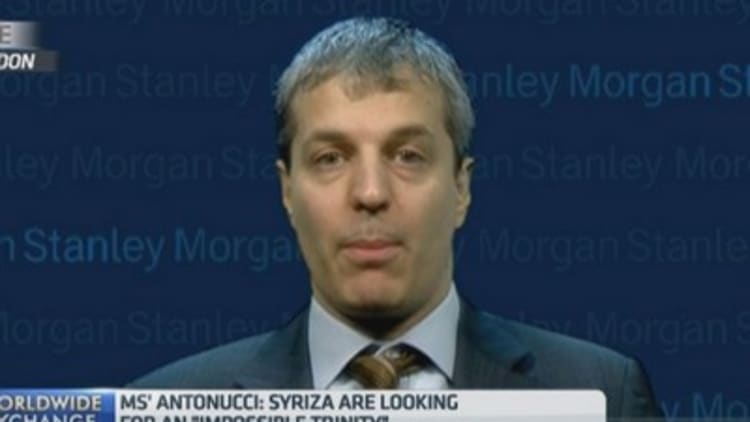Despite the strident attitude taken by Greece's new prime minister over the weekend, the plan that the country will present to its creditors among the euro zone finance ministers on Wednesday is likely to be somewhat softer in tone, CNBC has learned.
Greek Finance Minister Yanis Varoufakis will meet with the so-called Eurogroup on Wednesday with a series of requests that are based on suggestions made in 2013 by the Organization for Economic Cooperation and Development that were designed to make Greece's economy more competitive.
One of the proposals being put forth by Varoufakis will be the scrapping of one-third of the reforms imposed by Greece's creditors and their "memorandum of understanding," and instead replaced by reforms suggested by the OECD, according to finance ministry sources who spoke on condition of anonymity during a background briefing.
Word of a possible deal pushed European stocks higher Tuesday, until comments by senior German officials put a damper on the market's optimism.
German Finance Minister Wolfgang Schaeuble told reporters that Greece had not yet reached a deal with its partners and said the Eurogroup of finance ministers would not negotiate a new deal Wednesday.
The Greek government's proposal will be in four parts, CNBC has confirmed: Greece wants to replace part of the current bailout's conditions and replace them with 10 reforms from the OECD. It wants to reduce its primary surplus target of 3 percent of GDP to only 1.49 percent. It wants to cut Greek debt via a swap plan. And it wants a "humanitarian crisis" program proposed by Prime Minister Alexis Tsipras to take effect.
Read MoreEurope trades higher on talk of Greek bailout deal
The OECD analyzed the laws and regulations in place on the four most important sectors of Greece's economy: tourism, food manufacturing, building materials and retail. The sectors provide about 25 percent of the country's employment.
The group found hundreds of regulations that cause Greek businesses to struggle—and which many American business owners would find unfathomable.
In 2013, the OECD published a list of changes Greece should make to ensure a more competitive economy. At the time, the Greek government committed to them. But more than a year later, the reforms are half-done at best.
"Austerity" is the catch-all word for a long list of requirements imposed on Greece by its international creditors, in exchange for more than 250 billion euros ($280 billion) of bailout loans. But many, if not a majority of those requirements, remain unfulfilled—particularly those designed to help the Greek economy grow and recover from the depression of the last six years.
Read MoreUK PM fights low pay as party hawks luxury chalet
Politicians and economists refer to the changes as "structural reforms"—changes designed to loosen the economy from bureaucracy that has impeded Greek entrepreneurship.
To be sure, Greece has cut its government spending, from a high of $11.1 billion euros ($12.7 billion) in the fourth quarter of 2009 to 9.6 billion euros ($11 billion) in the third quarter of 2014, according to Trading Economics, citing the Greek National Statistical Service. But looser government control of the economy has come much more slowly, if at all.
For the first time in decades, Greece is expected to have or get close to having a balanced budget this year. It's an accomplishment lauded by the International Monetary Fund, one of the institutions that has loaned Greece billions of dollars in bailout money.

And even though the country has moved higher on the World Bank's Doing Business Index, it still remains far from the top.
The government is still deeply entrenched in the decision-making processes of businesses. And the bureaucracy, though reduced, is still overwhelming.
One of the most controversial proposed reforms, and one that never went through, was in the milk market. Greek prices for milk are 30 percent higher than in the rest of Europe.
Read More Populist parties: Kryptonite for Europe's leaders?
Greece is the only country in Europe that has legislation to determine the permitted shelf life for milk—five days. In other countries, the milk producer determines the "sell-by" date, and it's their responsibility to ensure the safety of the product.
The result: Foreign producers can't enter the Greek market because their product would be almost out of date by the time it gets to the shelf. Fresh milk is still consumable for as long as 15 days, according to the OECD, which recommended that the legislation be abolished.
The reform didn't happen. Instead, the permitted shelf life was extended to seven days, according to the Ministry of Development. A quick look at supermarket shelves by CNBC found only locally produced fresh milk.
The failure likely comes from an unwillingness or an inability on the part of the government to confront vested business interests that are trying to prevent competition, according to some Greek entrepreneurs.
—Reuters contributed to this report


